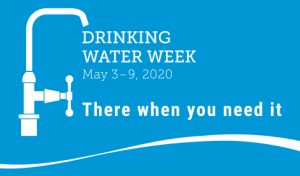(MARSHALL, Texas) – A fascination with chemistry, environmental science, health and safety can lead to jobs in Texas for water and wastewater treatment plant and system operators.
Graduates of Texas State Technical College’s Process Operations program in Marshall can pursue these jobs, along with those at chemical, gas and petroleum plants. The program exposes students to blueprint reading, industrial processes, physics, process instrumentation, and other topics.
“Our training is very broad-spectrum and can be applied to several industries that have a product requiring monitoring and control as it moves from raw material to finished product,” said Nicholas Cram, an instructor in TSTC’s Process Operations program.
The week of May 3 is Drinking Water Week as proclaimed by the American Water Works Association. The week’s theme, “There When You Need It,” celebrates the people who keep our drinking water supply safe.
“It is important to recognize the critical role water infrastructure plays, every day, in ensuring our tap water is there when you need it for drinking, cooking and hygiene,” said David LaFrance, the AWWA’s chief executive officer.
Water and wastewater treatment plant and system operators work to disinfect water, take samples, record meters, gauge readings and do equipment cleaning and maintenance.
Texas has more than 10,800 water and wastewater treatment plant and system operators, according to the U.S. Bureau of Labor Statistics. Workers are tested and licensed by the Texas Commission on Environmental Quality, which also offers online and in-person continuing education courses for workers.
The city of Marshall’s water treatment facility can produce 10 to 15 million gallons a day, while its wastewater treatment plant can handle eight to 9 million gallons a day.
Eric Powell, the city’s public works director, said his plant operators work 12-hour shifts during the round-the-clock operations.
The water treatment plant staff uses a supervisory control and data acquisition, or SCADA, system to monitor flow rates and other measurements.
“We do this via wireless and cellular connections and computer software,” he said. “That technology provides us an opportunity to manage remotely. Before that, you had to go to each facility and read a pressure gauge.”
Powell said technology for water treatment changes quickly and can often be costly.
“Wastewater treatment is very traditional,” he said. “The technology is the pumps, motors, filters and screens. It is not software- and computer-based.”
The federal bureau has projected more than 120,000 jobs nationwide up 2028, with people having automation and mechanical skills gaining better opportunities for employment. Powell said college internships are great opportunities for students to learn about water and wastewater work.
“You will always have a job because you need drinking water and there needs to be a place for wastewater to go,” Powell said. “You have to have a sense of public service in your head. We will always need young people to follow the retiring group.”
For more information on Texas State Technical College, go to tstc.edu.
